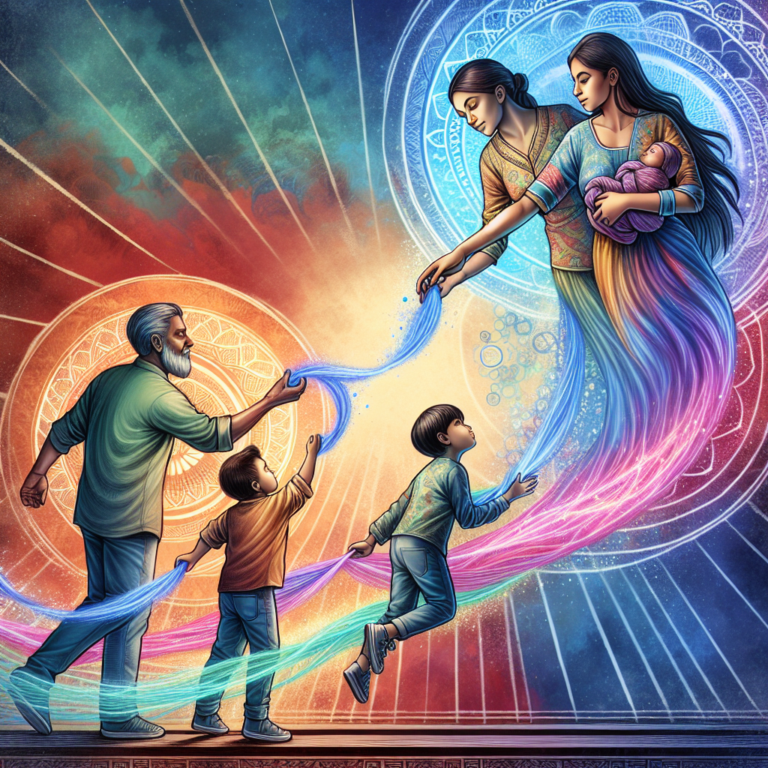Introduction
Karma, derived from the Sanskrit word "karman," meaning action, is often interpreted as the law of cause and effect. In many spiritual traditions, it suggests that our actions—be they good or bad—have consequences that reverberate throughout our lives and potentially beyond. This foundational principle of karma offers profound insights and creative solutions that can be applied to personal growth and development. In this article, we will explore how adopting a karma perspective can foster creative problem-solving abilities, enhance emotional intelligence, cultivate resilience, and ultimately guide us toward a more fulfilling and harmonious existence.
Understanding the Concept of Karma
In contemporary discourse, karma is often reduced to a simplistic idea of "what goes around comes around." However, it is a richly layered concept that encompasses not only the consequences of our actions but also the intention behind those actions. In essence, karma serves as a reminder that we are the architects of our own lives; our present circumstances are a reflection of our past decisions, thoughts, and behaviors.
The Power of Intention
At the heart of understanding karma lies the importance of intention. According to various philosophical traditions, including Buddhism and Hinduism, intention is the driving force behind our actions and the quality of the resulting karma. When we act with positive intention—compassion, kindness, and love—we cultivate good karma, leading to beneficial outcomes. Conversely, actions borne from negative intentions—anger, jealousy, or greed—lead to detrimental consequences.
This understanding allows us to reframe our approach to challenges. Instead of feeling victimized by our circumstances, we can use our past actions as a springboard for positive change. By aligning our intentions with constructive outcomes, we can explore creative solutions that enhance our personal growth.
Self-Reflection: The Mirror of Karma
Self-reflection is key to understanding the karma perspective. It encourages a deep examination of our actions, intentions, and their impact on ourselves and others. By engaging in self-reflection, we can identify patterns in our behavior that may not serve our growth and well-being. This process can involve journaling, meditation, or seeking feedback from trusted friends and mentors.
In cultivating self-reflection, we might ask ourselves: What patterns do I notice in my behavior? How do my intentions align with my current circumstances? What changes can I make to create a more positive outcome? By deeply engaging in this introspection, we open ourselves to creative solutions that foster personal growth.
Creative Problem-Solving Through the Karma Lens
The karma perspective encourages a proactive approach to life, transforming how we frame challenges and setbacks. Many of us view problems as obstacles, yet viewing them through the lens of karma can help us see them as opportunities for learning and growth. Here are some ways this perspective enhances our problem-solving abilities:
1. Embracing Responsibility
When we adopt a karma perspective, we recognize our role in co-creating our reality. This empowers us to take responsibility for our actions and their outcomes. Instead of attributing our struggles to external factors—such as other people’s choices or fate—we can analyze our role in these situations. This responsibility opens the door to creative solutions:
Actionable Change: By recognizing what led to our current circumstances, we can brainstorm actionable steps to change our behavior or attitudes. For instance, if a relationship is strained due to misunderstandings, we can take the initiative to communicate openly and compassionately, striving to understand the other person’s perspective.
- Learning from Mistakes: With responsibility comes the opportunity to learn from our past mistakes. Rather than being defeated by failures, we can reflect on what went wrong, adjust our strategies, and develop resilience. This iterative process transforms setbacks into valuable learning experiences.
2. Expanding Perspective
A karma perspective encourages us to adopt a broader viewpoint, fostering empathy and understanding. By recognizing that we are interconnected, our approach to problem-solving becomes more inclusive and creative:
Diverse Solutions: When faced with a challenge, considering the perspectives and experiences of others enriches our approach to finding solutions. Collaborative brainstorming can lead to innovative ideas that we might not have considered alone. For example, engaging in group discussions or community solutions can amplify creativity in tackling social or environmental issues.
- Seeing Beyond the Immediate: Incorporating a long-term view encourages us to think beyond immediate gratification or short-term results. This can lead to creative solutions that align with our core values and contribute positively to our growth and the well-being of others.
3. Cultivating Patience and Persistence
Karma teaches us that change does not happen overnight. Sometimes, our efforts take time to manifest, and this can be challenging in a world that often prioritizes instant results. However, embracing this patience can open up avenues for creative problem-solving:
Mindfulness in Action: By practicing mindfulness, we learn to stay present with our challenges, allowing for deeper insight into our emotions and thoughts. This presence enables us to respond thoughtfully rather than react impulsively, leading to more creative and effective solutions over time.
- Endurance and Growth: Challenges can test our determination. By viewing these tests through the lens of karma, we cultivate an attitude of perseverance. We shift our mindset from “This is too hard” to “This is an opportunity for growth.” This shift can inspire innovative solutions we might have otherwise overlooked.
Emotional Intelligence and the Karma Perspective
Personal growth is intimately tied to emotional intelligence—the ability to understand and manage our emotions while empathizing with others’. The karma perspective inherently cultivates emotional intelligence, which supports our ability to navigate life’s complexities creatively and effectively.
1. Developing Self-Awareness
Self-awareness is at the core of emotional intelligence. By understanding our emotional triggers and responses, we can approach challenges with greater clarity. The karma lens enhances this self-awareness:
- Identifying Emotional Patterns: The principle of karma encourages us to explore the roots of our emotional reactions. By examining how past actions influence our current feelings, we can identify patterns and choose more empowering responses. For example, if past behaviors elicit feelings of inadequacy, we can replace negative self-talk with affirmations and constructive action.
2. Cultivating Empathy
The interconnected nature of karma underscores the importance of empathy. By recognizing that others are navigating their own karmic paths, we can foster deeper connections and improve our communication:
Active Listening: Practicing active listening enhances our ability to empathize. By genuinely engaging with others’ perspectives, we become more aware of how our actions impact them. This awareness can lead us to propose solutions that not only address our needs but also honor the needs of others.
- Conflict Resolution: Understanding that every conflict arises from misalignment in intentions and perceptions allows us to approach disagreements with compassion. Rather than resorting to blame, we can collaboratively seek understanding and resolution, leading to healthier relationships and creative problem-solving.
3. Managing Emotions
Effective emotional management is essential for personal growth. The karma perspective offers tools and insights that can help us navigate our feelings:
Reframing Negative Emotions: When we encounter negative emotions—such as anger, frustration, or sadness—we can view them as signals rather than obstacles. This reframing encourages us to explore the root of these emotions and potential solutions. For instance, if we feel anger due to a perceived injustice, this can motivate us to take positive, constructive action rather than wallowing in negativity.
- Mindful Responses: The practice of mindfulness can assist us in responding to emotional challenges with grace. By cultivating a non-judgmental awareness of our emotions, we can choose responses that align with our values and intentions.
Resilience: Building Strength through Karma
Resilience—the ability to bounce back from adversity—is crucial for personal growth. A karma perspective fosters resilience by teaching us that challenges are part of the learning process, valuable stepping stones towards wisdom and strength.
1. Viewing Adversity as a Teacher
The karma perspective invites us to see adversity as an essential component of our journey. Rather than fearing challenges, we can embrace them as opportunities for learning:
- Shift in Mindset: By recognizing that every challenge carries a lesson, we cultivate a growth mindset. This shift allows us to approach difficulties with curiosity rather than dread. For example, if we encounter a setback at work, we can analyze what went wrong, adapt, and grow from the experience rather than succumbing to self-pity.
2. Building a Supportive Network
Resilience is often strengthened through community and support. The karma principle emphasizes interconnectedness and collaboration:
- Mutual Aid: By leveraging our relationships and fostering a sense of community, we can create a safety net of support when facing challenges. Offering and receiving help cultivates a reciprocal environment where creative solutions can blossom. Recognizing that we are all in this together reinforces our resilience.
3. Creating a Vision for the Future
A future-focused mindset fosters resilience by allowing us to envision positive outcomes. The karma perspective encourages us to align our actions with our aspirations:
- Goal Setting: Setting intentions is akin to planting seeds in our karmic garden. By consciously choosing goals that reflect our values and aspirations, we create a roadmap for our growth. This forward-thinking approach allows us to remain focused during challenging times, knowing that our present actions are shaping our future.
Practical Applications of the Karma Perspective
Having explored the theoretical foundations of the karma perspective, we can now delve into practical applications that facilitate personal growth. These strategies can be integrated into our daily lives, offering creative solutions to common challenges:
1. Daily Mindfulness Practice
Incorporating mindfulness into our daily routines can help us remain present, enhancing our self-awareness and emotional intelligence. Activities such as meditation, mindful walking, or journaling can cultivate a deeper connection to our thoughts and emotions, helping us to align our intentions with our actions.
2. Intention Setting Rituals
Creating intentionality rituals—such as writing down our goals and values or practicing gratitude—can reinforce our commitment to positive action. These rituals can serve as reminders of the karma perspective, emphasizing how the energy we put into the world influences our experiences.
3. Collaborative Problem-Solving Workshops
Engaging in collaborative workshops can foster community and creativity. By bringing together diverse perspectives, we can brainstorm innovative solutions to common challenges, empowering everyone involved to learn from one another.
4. Reflective Journaling
Incorporating reflective journaling into our routine can facilitate self-examination and foster emotional growth. Writing about our feelings, actions, and the outcomes can help us trace the patterns of our karma and identify areas for growth.
5. Embracing Failure as Feedback
Shift the narrative around failure by viewing it as a natural part of growth. By analyzing the lessons embedded in our setbacks and using that knowledge to inform future actions, we can foster resilience and creativity. Creating a culture of experimentation—where it’s okay to try, fail, and learn—will enhance our overall personal development.
Conclusion
Embracing the karma perspective offers a transformative approach to personal growth. By recognizing the interconnectedness of our actions, intentions, and outcomes, we pave the way for resilience, emotional intelligence, and creativity in problem-solving. It empowers us to take responsibility for our lives and inspires a deep commitment to lifelong learning.
Through self-reflection, empathy, and intentionality, we become better equipped to navigate life’s challenges. As we explore creative solutions through the lens of karma, we find that personal growth is not merely a destination but a continuous journey enriched by the wisdom of our experiences.
In a world that often seeks immediate results, the lessons of karma remind us that the processes of growth, healing, and transformation require patience, connection, and an openness to learning. By embracing these principles, we not only cultivate a deeper sense of self-awareness but also contribute positively to the tapestry woven by the lives we touch.
Ultimately, what we sow is what we reap, and by consciously tending to the seeds of our actions and intentions, we can create a future that is rich with meaning, creativity, and love.





